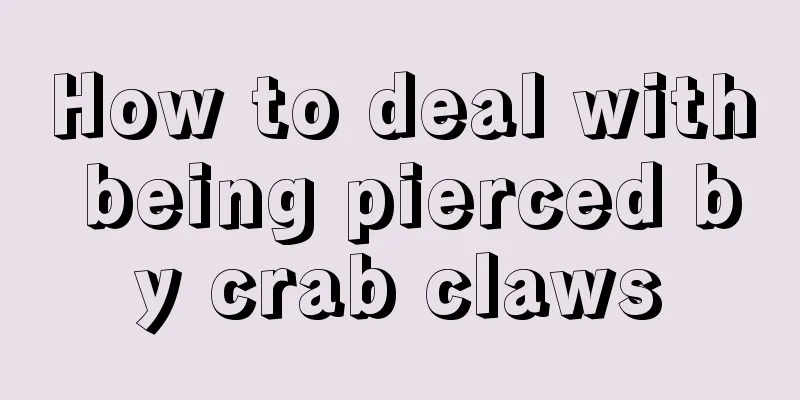How to deal with being pierced by crab claws

|
Many people like to eat crabs. Crabs contain a lot of protein and nutrients, which are very good for improving people's physical fitness. More and more people like to buy crabs and handle them themselves at home, but if you are not careful, it is easy to get your hands pricked by the crab claws and get wounds. This situation must be dealt with promptly, otherwise it is easy to get infected. So, what should you do if you get pierced by a crab claw? The wound is deep and narrow, which is the favorite of tetanus bacillus The wounds caused by being stabbed by crab claws or fish fins often have one characteristic: the wounds are mostly deep and narrow. In this way, an oxygen-deficient or even anaerobic environment is formed deep in the wound, which is particularly suitable for the reproduction and growth of some anaerobic bacteria. Anaerobic bacteria are bacteria that grow better in the absence of oxygen than in an aerobic environment. Among them, Clostridium tetani is an anaerobic bacterium that people are more familiar with. Tetanus bacteria like to live in soil, rust, and wood splinters. After infecting the human body, it releases toxins and causes muscle spasms throughout the body. If people have deeper wounds, doctors generally recommend tetanus antitoxin to prevent infection. For this type of wound, you can first rinse it with clean water, bandage it simply, and then go to the hospital for debridement. The most feared thing is being infected with "Marine Vibrio"! Vibrio vulnificus, also known as marine Vibrio vulnificus, is a bacterium that lives in the ocean. It mostly floats in seawater or attaches to marine life such as fish, shrimp, oysters, and crabs. People are at risk of infection if they come into contact with seafood with wounds on their skin, or eat seafood raw. It is highly toxic and after infecting the human body through a wound, it can cause serious wound infection and lead to severe gangrene. The bacteria can also enter the blood circulation and cause acute systemic infection, namely sepsis. Patients infected with this bacteria may suffer amputation at the very least, or even lose their lives at the worst! Therefore, when handling seafood, necessary protective measures must be taken. When you have wounds on your body, try to avoid direct contact with seafood and don't swim in the ocean. |
<<: The efficacy and function of loofah
>>: Hand pierced by shrimp, life in danger
Recommend
The more prominent manifestations of uterine cancer also include increased secretions
The more prominent manifestation of uterine cance...
Can I put things on top of the refrigerator?
In life, many people put some things on top of th...
Why do you need to shave your hair during surgery
Surgery is a very important process. Patients sta...
What are the less common symptoms of lung cancer? Three atypical symptoms of lung cancer
Lung cancer has a high incidence and mortality ra...
Habitual dislocation
There are always bumps and bruises in life, and d...
What is wrong with blue veins in the body?
The structure of the human body is very complex. ...
How long can you live with small cell lung cancer
Small cell lung cancer is a form of cancer. More ...
Treating Gallbladder Cancer with the Principle of Strengthening the Body and Reinforcing the Roots
Traditional Chinese medicine believes that the fo...
What is the reason for pimples on the buttocks?
If you find lump-like things growing inside your ...
Homemade recipe for honey walnut kernels
Honey is a very common food in people's daily...
Is black tea fermented tea?
As we all know, fermented tea refers to tea that ...
The difference between cheese slices and cheese slices
Many foods in our country are from the West. Chee...
The efficacy and brewing of golden chrysanthemum
When drinking golden chrysanthemum, the best way ...
How to take a bath with roses
To take a rose bath, boil the roses in water for ...
What to add to hot pot oil to enhance flavor
Each region chooses different ways to eat hot pot...









